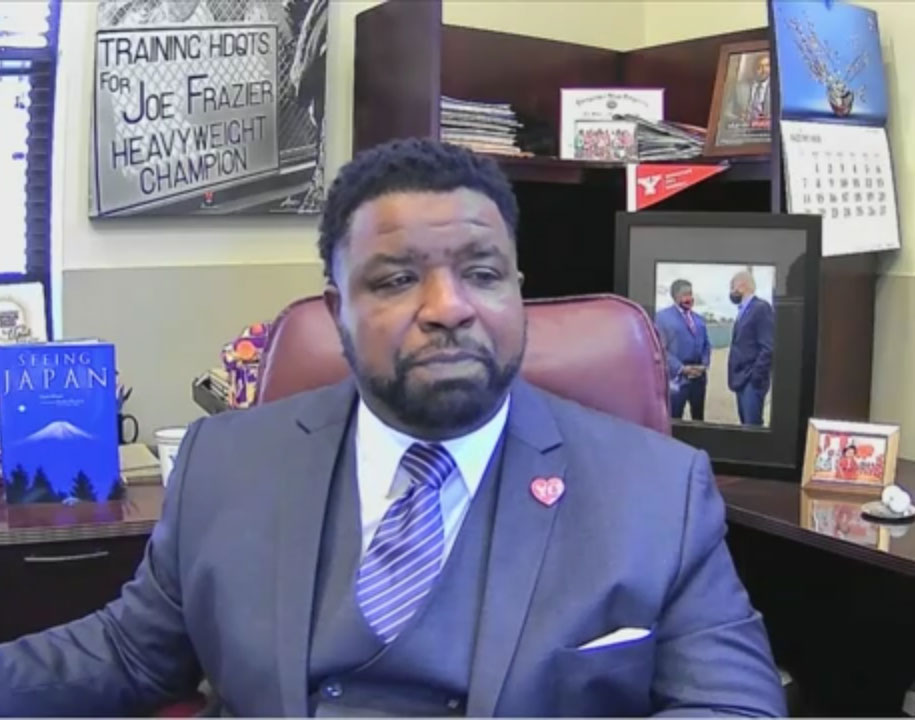Mayor Cites Concerns on COVID, Evictions at Senate Hearing
YOUNGSTOWN, Ohio – The COVID-19 pandemic exposed and exacerbated long standing economic, social and health problems in Youngstown, Mayor Jamael Tito Brown told members of the U.S. Senate Banking, Housing and Affairs Committee during a Thursday hearing.
The Youngstown mayor was among five individuals who testified during the 90-minute hearing, which was conducted virtually and carried on the Senate committee’s website.
“The Coronavirus Crisis: Paving the Way to an Equitable Recovery,” was the first hearing held by the committee since U.S. Sen. Sherrod Brown, D-Ohio, took over as chairman.
“It should not be a surprise that our first hearing is about the coronavirus. It has affected every American’s health, home, family, workplace and the entire economy for nearly the last year,” Sen. Brown said in his remarks to open the hearing. “On this and on all of the issues to come before this committee, we are going to get to work for all the Americans who have not had much of a voice in Washington, or in our economy.”
It’s also not a coincidence that so many of the workers that corporations treat as expendable are people of color or women, he said. “This pandemic hasn’t just exposed racial disparities and income inequality and gender disparities – it’s made them worse,” he stressed.
Democrats in Congress are pursuing a $1.9 trillion coronavirus relief package, the American Rescue Plan, that would include funding for vaccine production and distribution, aid to state and local governments, money to reopen schools, additional direct payments to taxpayers and extended enhanced unemployment benefits.

Any federal aid must be part of a “long-term, coordinated strategy” to get the resources needed to address the pandemic’s public health impact and assure that housing, transportation and small business efforts are included, Mayor Brown said.
The city, which has struggled to recover in the decades since the steel mill shutdowns that began in the mid-1970s, has been particularly hard hit by the pandemic, which “further eviscerated” that rebound, he asserted.
“COVID-19 has been a great revealer of the health, social, economic and racial disparities of our community,” he said. “Small to medium-sized businesses are also feeling the impact of the pandemic, especially minority-owned businesses, many of whom did not have an established relationship with a banking institution prior to the pandemic.”
Another Ohio witness, Jyoshu Tsushima, staff attorney for the Legal Aid Society of Columbus, testified on the importance of economic support for renters and protections from evictions.
Even before the pandemic, more than 54,000 low- to moderate-income households in Central Ohio spent more than half their incomes on housing. Now, tenants and landlords check in for eviction court. Up to 100 eviction trials are scheduled daily Monday through Friday in Franklin County Municipal court. Even the eviction moratorium approved as part of relief legislation has several loopholes, he pointed out.
Eviction – or just the threat of eviction – makes it difficult for families to operate “with any normal expectation,” and consequences for evictions take years to recover from, Tsushima said. Students can’t perform well in school because they are bouncing between residences, having long-term consequences for their higher education and future employment prospects.
“The eviction issue goes hand in hand with the pandemic,” Mayor Brown said. Families who are evicted and have to move into another household, if they are infected, risk spreading the virus, he noted. In addition, many families fall victim to predatory lenders because of conditions caused by the pandemic.
And issues are disproportionately hitting communities of color, Tsushima said. More than 60% of his agency’s clients are Black, even though Black residents represent just 24% of Columbus’ population.
Even when assistance arrives, it mostly is used to pay off prior debts, leaving nothing for next month’s rent, he explained. “So many of our clients live this cycle month-to-month. They are not hanging by a thread. They are constantly waiting for one to be thrown to save them,” he said.
The $25 billion for transit in the Coronavirus Aid, Relief and Economic Security – or Cars – Act and the $14 billion in the subsequent Coronavirus Response and Relief Supplemental Appropriations Act of 2021 were critical to keeping buses and trains running and getting essential workers to their jobs, said John Costa, international president for the Amalgamated Transit Union.
“Of course, these days, the downside to staying on the job as a frontline worker – especially as a transit bus operator – is that you are constantly exposed to the coronavirus, putting your life on the line every day,” he continued. In addition, transit workers are faced with the risk of physical assault from passengers when they are asked to comply with mask requirements or even when paying fares, he said.
Republicans on the committee, led by its ranking Republican U.S. Sen. Pat Toomey of Pennsylvania, voiced several objections to the Democrats’ $1.9 trillion bill, including the untargeted nature of the relief being proposed.
Congress responded to the pandemic in “an extraordinary way” by passing five bipartisan coronavirus bills to date, but Democrats are using a process not designed to find agreement – budget reconciliation – to enact a “longstanding Democratic party wish list,” Toomey argued.
Among the points he made was that the majority of those who received the universal stimulus checks were people who did not experience any loss of income because of the pandemic.
“The only organizing principle seems to be to spend as much money as possible,” he remarked. “This bill is wasteful, not at all targeted.”
Unlike the five prior aid pandemic-related packages approved by Congress, the American Rescue Plan is neither appropriately timed nor appropriately scaled, said Douglas Holtz-Eakin, president of the American Action Forum.
“The fact is in 2020 aggregate income did not collapse,” he said. Employee compensation rose 2%, wages and salaries were up 2.2% and the savings rate reached an all-time record high.
Further, he agreed with Toomey that the vast majority of relief checks would go to individuals and families whose incomes were not interrupted and are “relatively affluent,” and that it was not conducive to the economy to send them money. “And there is a risk,” he added.
That risk is that the money would flow into savings and, if the individual is looking for a higher yield, into the stock market. Recessions in the 21st century have been preceded by financial volatility. “I worry about the implications of hundreds of billions of dollars sloshing around financial markets for no good reason,” he said.
Gianni Cracchiolo, whose family owns Sal & Jerry’s Bakery in New York, said the bakery was forced to close last August. COVID-19 and the resulting lockdowns weren’t the main cause of the closure but “the straw that broke the camel’s back.” He instead blamed gradual hikes in the minimum wage that began with the bakery’s low-wage and beginning workers and eventually led to pay increases for higher-level and longer-tenured employees.
“It was a domino effect,” he remarked. Hikes in prices to compensate only ended up benefiting supermarkets and big-box stores.
He also complained that the enhanced unemployment benefits, which resulted in many workers finding it more profitable to stay at home than to work, provided a disincentive to workers. In addition, Economic Injury Disaster Loan assistance didn’t even cover a month’s expenses.
“The federal government provided more help for people to stay home than for businesses to stay open,” he said.
U.S. Steve Danes, R-Mont., said that the country is “finally turning the corner” on the coronavirus, and it was frustrating to see his Democratic colleagues push a “partisan” bill. Congress should be tracking the funds approved in the most recent relief bill to see where more money might be needed “and also where it isn’t.”
Further, he disputed the need for the $350 billion in the bill for state and local governments, which he said is going to help states like New York and Illinois that had “fundamental fiscal problems” prior to the pandemic. He also was concerned that only 1% of the package goes to vaccines and just 5% is focused on public health needs around the pandemic.
“We should be doubling down on those efforts,” he said.
Once employees have access to the vaccine, hiring employees back should not be difficult, Cracchiolo said.
U.S. Sen. Jon Ossoff, D-Ga., disputed criticisms that the relief bill was not bipartisan, citing 80% support from the public. He also pointed out that families during the pandemic have had to bear additional expenses such as child care costs and face significant medical bills, and many are in precarious financial situations.
“The working families in this country are not paying the stock market with this money,” he said.
Copyright 2024 The Business Journal, Youngstown, Ohio.



